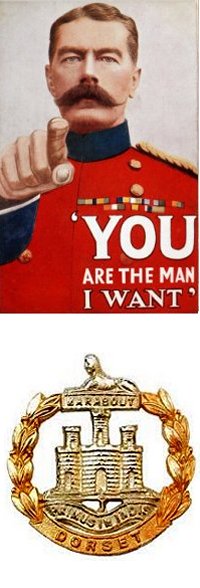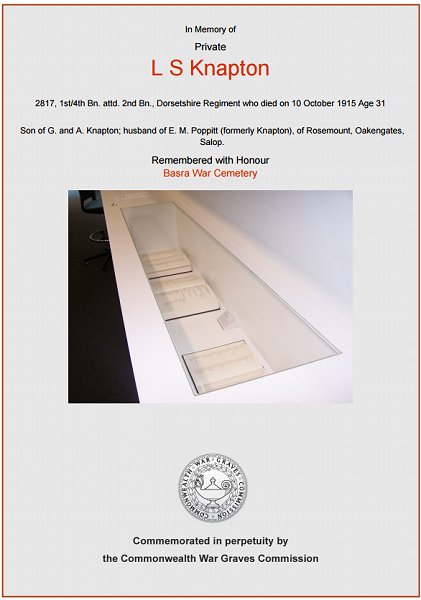yeovil at War
Leonard Stephen Knapton
Died in Mesopotamia
Leonard Stephen Knapton was born in Yeovil on 20 March 1887 at 41 Hendford Hill. He was the son of grocer George Knapton (1849-1925), originally from Bridgwater, and Amy née Tooms (1857-1908), originally from Boston, Lincolnshire. George and Amy were to have five children; George (b1880), Harold (b1882), Bernard (1885-1895), Leonard and Winifred May (1889-1966). In the 1891 census the family were living above George's grocery at 86 Middle Street, together with two domestic servants. In 1895 (at least) Leonard attended Reckleford School.
In the 1901 census, while George Knapton languished in HM Prison, Shepton Mallet, (for issuing a forged promissory note for £10 with intent to defraud) Amy and the children were recorded at Weymouth (presumably to avoid the shame). 14-year old Leonard was working as an office boy.
In the 1911 census Leonard was recorded as a boarder at Punch Bowl Cottages, Hindhead, Surrey. In the winter of 1914 he married Elsie M Lambert at Southampton. In 1915 Leonard was registered living in a furnished first floor bedroom above the Punch Bowl Inn at Hindhead, at an inclusive rent of 15s per week.
 Leonard
enlisted at
Dorchester,
Dorset,
presumably
during 1915,
(giving his
address as
Hindhead)
joining the
1/4th Battalion,
Dorsetshire
Regiment. His
Service Number
was 2817. He was
very soon
attached to the
2nd Battalion,
presumably in
order to bolster
the depleted
numbers of the
2nd brought
about by actions
in Mesopotamia.
Leonard
enlisted at
Dorchester,
Dorset,
presumably
during 1915,
(giving his
address as
Hindhead)
joining the
1/4th Battalion,
Dorsetshire
Regiment. His
Service Number
was 2817. He was
very soon
attached to the
2nd Battalion,
presumably in
order to bolster
the depleted
numbers of the
2nd brought
about by actions
in Mesopotamia.
In August 1914 the 2nd Dorsets were in India. Initially prepared for service in East Africa, their planned destination changed first to Europe then, at short notice, to the Gulf. Turkey’s entering the war threatened supplies of oil from the Shatt-al-Arab at the mouth of the rivers Tigris and Euphrates in Mesopotamia (now Iraq). The extension of a German-financed railway to Baghdad provided another threat to be countered.
Although the Battalion’s landings in the Shatt-al-Arab on 6 November 1914 met little opposition, the Turks, backed by Arab levies, were quick to respond. The Dorsets faced stiff fighting expelling the Turks from Saihan on 15th November and Saihil two days later. In eleven days these actions and the diseases prevalent in the marshy conditions of the region cost the Battalion 25% of its fighting strength. They reached Basra on the 23 November 1914.
After minor engagements, mostly against Arab insurgents, the 2nd Dorsets advanced to Shaiba (ancient Sheba). In February 1915 they were forced to wade knée-deep through the annual flooding of the two rivers. At Shaiba they endured very difficult conditions, including sand storms. Mounting frequent offensive patrols, they fought major actions on 3 March and 14 April in which the depleted Battalion showed great resilience, earning Shaiba as a new Battle Honour. It is likely that Leonard joined his battalion at this time.
Recognising that Kut-al-Amara was key to preventing the Turks encircling British forces on the Tigris, General Townshend’s division (including the 2nd Dorsets) took the town on 28th September 1915. Despite the depleted state of his units, Townshend pushed on towards Baghdad. It was during this push to Baghdad that Private Leonard Knapton died on 10 October 1915. He was aged 31.
Leonard was buried at Basra War Cemetery, grave V.D.9. His name was added to the War Memorial in the Borough in 2018.
gallery

The Commonwealth War Graves Commission certificate in memory of Leonard Knapton.